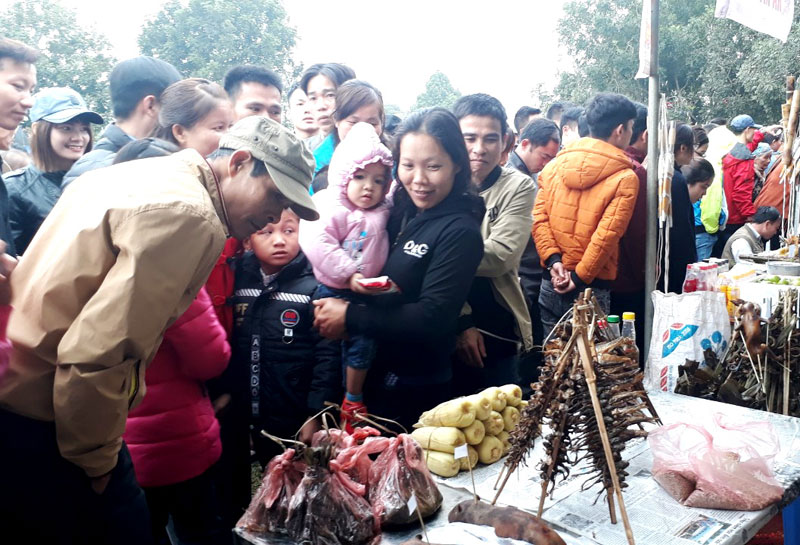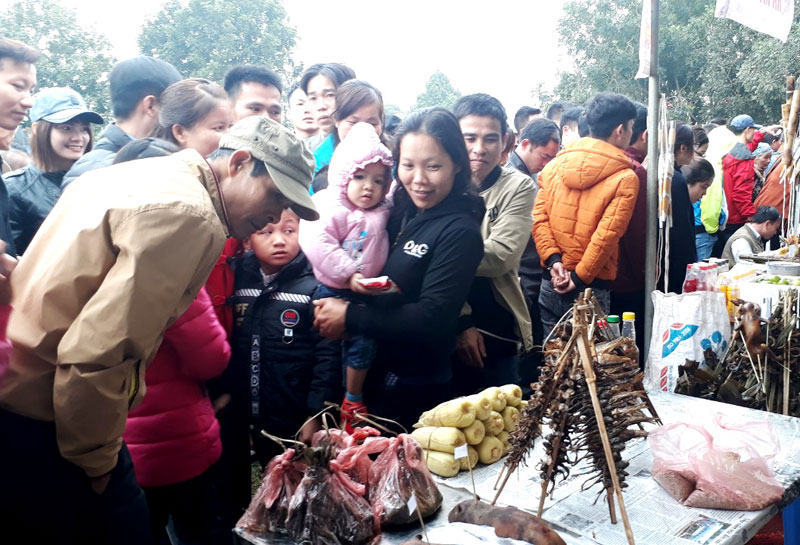
(HBO) – In traditional festivals, especially those organised after the lunar New Year, the presence of traditional dishes for display or selling has become a familiar image. It can be said that traditional cuisine has been existing and promoted in local festivals.

At
Muong Bi Khai ha (going down the field) festival, food stalls always draw a
crowd of many visitors.
The
Muong Bi Khai ha (going down the field) festival is an address visitors cannot miss
if wanting to learn about the Muong ethnic group’s culture. At this year’s
festival, each town and commune in Tan Lac district had a booth displaying its
specialties, in which dishes bearing Muong people’s cultural characteristics
always attract a lot of visitors.
On
the path to the festival, bamboo-tube rice, grilled fish and hot vegetable
steamers left strong impressions on visitors. Do Nhan commune brought its
attractive traditional dishes to this year’s festival, including grilled "dam
xanh” fish, steamed vegetables with 18 different kinds, steamed stream fish,
and seven-colour sticky rice. For Muong people, steaming and grilling have long
been the two most typical ways of cooking. They also like eating forest
vegetables with bitter taste or cooking meat with sour bamboo shoots and "la
lom” – a typical kind of leaf of the Muong people. Those typical dishes were
easily found in Muong Bi Khai ha festival. Steamed or grilled fish, chicken
meat fried with sour bamboo shoots, mixed vegetables, and bamboo-tube rice were
seen in almost all booths. In addition, many specialties in the mountainous
region, including frog, squirrel, and mouse, were also sold in the festival.
The
booths were busy at noon. The space under the bamboo canopy was an ideal place
for visitors to relax and enjoy traditional dishes of the Muong people./.
With an increasingly vibrant and widespread emulation movement aimed at building cultured residential areas and cultured families, Yen Thuy District has been making steady progress toward improving both the material and spiritual well-being of its people, while fostering a civilized, prosperous, beautiful, and progressive community.
Once lacking recreational spaces and community facilities, Residential Group 2 in Quynh Lam Ward (Hoa Binh City) has recently received attention for the construction of a new, spacious, and fully equipped cultural house. The project followed the model of state support combined with public contributions in both labor and funding.
The "All people unite to build cultural life" movement, which has been effectively integrated with Kim Boi district’s socio-economic development goals, is fostering a lively spirit of emulation across local residential areas, hamlets, villages, public agencies, and enterprises. In addition, through the initiative, traditional cultural values are being preserved and promoted, while community solidarity and mutual support in poverty reduction and economic development are being strengthened.
A working delegation of the Hoa Binh provincial People’s Committee led by its Permanent Vice Chairman Nguyen Van Toan on June 11 inspected the progress of a project to build the Mo Muong Cultural Heritage Conservation Space linked to tourism services in Hop Phong commune, Cao Phong district.
Born and growing in the heroic land of Muong Dong, Dinh Thi Kieu Dung, a resident in Bo town of Kim Boi district, in her childhood was nurtured by the sweet lullabies of her grandmother and mother. These melodies deeply imprinted on her soul, becoming an inseparable part of her love for her ethnic group's culture. For over 20 years, this love for her hometown has driven Dung to research, collect, and pass down the cultural values of the Muong people to future generations.
In the final days of May, the Ethnic Art Troupe of Hoa Binh Province organized performances to serve the people in remote, mountainous, and particularly disadvantaged areas within the province. These were not just ordinary artistic shows, but they were the meaningful journeys aimed at spreading cultural values, enhancing the spiritual life of the people and contributing to the preservation of ethnic minority cultural identities.



